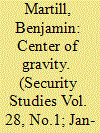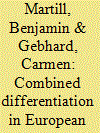| Srl | Item |
| 1 |
ID:
164068


|
|
|
|
|
| Summary/Abstract |
Cold War strategy in Western Europe almost exclusively followed the US policy of containment. Conventional explanations for this continuity, however, fail to account for both the strategic rationale and the scale of domestic support behind attempts to disengage from the Cold War. This article seeks to explain why containment won out over disengagement in European strategy. By highlighting the underlying liberal tenets of containment, it argues this victory owed more to the advantages afforded the political center by the political institutions of Western Europe than to the logic of containment strategy itself. The occupation of the center-ground by advocates of containment afforded them distinct institutional advantages, including an increased likelihood of representation in government, greater bargaining strength relative to other parties, and limited sources of viable opposition. The dependence of containment strategy on centrist strength is demonstrated through a discussion of the politics of strategy in the French Fourth Republic.
|
|
|
|
|
|
|
|
|
|
|
|
|
|
|
|
| 2 |
ID:
190067


|
|
|
|
|
| Summary/Abstract |
Sustaining meaningful defense cooperation in Europe is made difficult by defense-industrial fragmentation, a multiplicity of institutional frameworks, divergent strategic cultures and domestic opposition to integration. The European Union’s recent foray into defense integration incorporates multiple forms of differentiation to overcome these barriers, with Permanent Structured Cooperation (PESCO) characterized by selective membership, external participation, and project-based clustering. Such “combined differentiation” offers an instructive example of how EU practices and principles can contribute to meaningful defense collaboration, even though Brussels is often thought a weak actor externally. It also illustrates how distinct forms of differentiation can be embodied within a single structure to accommodate complexity in strategic preferences. Using the example of PESCO, this article shows how “combined differentiation” has emerged as a response to the nature of the European defense landscape and how debates between member states about how to respond to specific challenges have brought about further differentiation over time.
|
|
|
|
|
|
|
|
|
|
|
|
|
|
|
|
| 3 |
ID:
180827


|
|
|
|
|
| Summary/Abstract |
Research on political parties and foreign policy has grown in recent years in response to disciplinary and real-world changes. But party research still bears the imprint of earlier scepticism about the role of parties. The result is scholarship which is disaggregated, which avoids difficult cases for parties, and which has focused more on showing that parties matter relative to structural accounts of foreign policy-making. This article takes stock of recent research on political parties, party politics and their role in foreign policy-making. We argue that it is time for party research not only to embrace the question of whether parties matter but also how, when and where they matter. This requires a move away from most-likely cases and the realist foil towards an embrace of the complexity of party positions. Building on International Relations, comparative politics and foreign policy analysis scholarship, we suggest four avenues deserving of greater scholarly focus: 1) ideological multidimensionality; 2) parties as organizations and the role of entrepreneurs; 3) parties as transnational foreign policy actors; and 4) the interaction between parties and the changing global order. We propose how these literatures can help identify new research questions, contribute to theory development and help define scope conditions. This will hopefully help scholars establish benchmarks for judging the efficacy of parties in foreign policy-making.
|
|
|
|
|
|
|
|
|
|
|
|
|
|
|
|